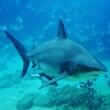Background
- Shark cartilage is one of the most popular supplements in the United States, with over 40 brand name products sold in 1995 alone. Primarily used for cancer, its use became popular in the 1980s after several poor-quality studies reported "miracle" cancer cures.
- Laboratory research and animal studies of shark cartilage or the shark cartilage derivative product AE-941 (Neovastat®) have demonstrated some anti-cancer (anti-angiogenic) and anti-inflammatory properties. However, there is currently not enough reliable human evidence to recommend for or against shark cartilage for any condition. There are several ongoing cancer studies. Many trials are supported by manufacturers of shark cartilage products, which raises questions about impartiality.
- Commercial shark cartilage is primarily composed of chondroitin sulfate (a type of glycosaminoglycan), which is further broken down in the body into glucosamine and other end products. Although chondroitin and glucosamine have been extensively studied for osteoarthritis, there is a lack of evidence supporting the use of unprocessed shark cartilage preparations for this condition. Shark cartilage also contains calcium. Manufacturers sometimes promote its use for calcium supplementation.
- Shark cartilage supplements at common doses can cost as much as $700-1,000 per month.
References
- Batist G, Patenaude F, Champagne P, et al. Neovastat (AE-941) in refractory renal cell carcinoma patients: report of a phase II trial with two dose levels. Ann Oncol 2002;13(8):1259-1263.
View Abstract - Escudier B, Choueiri TK, Oudard S, et al. Prognostic factors of metastatic renal cell carcinoma after failure of immunotherapy: new paradigm from a large phase III trial with shark cartilage extract AE 941. J Urol 2007 Nov;178(5):1901-5.
View Abstract - Dupont E, Savard RE, Jourdain C, et al. Antiangiogenic properties of a novel shark cartilage extract: potential role in the treatment of psoriasis. J Cutan Med Surg 1998;2(3):146-152.
- Gingras D, Boivin D, Deckers,C, et al. Neovastat-a novel antiangiogenic drug for cancer therapy. Anticancer Drugs 2003;14(2):91-96.
View Abstract - Hassan ZM, Feyzi R, Sheikhian A, et al. Low molecular weight fraction of shark cartilage can modulate immune responses and abolish angiogenesis. Int Immunopharmacol 2005;5(6):961-970.
View Abstract - Hyodo M, Mikami T, Faissner A, et al. Nationwide survey on complementary and alternative medicine in cancer patients in Japan. J Clin Oncol 4-20-2005;23(12):2645-2654.
View Abstract - Kralovec JA, Guan Y, Metera K, et al. Immunomodulating principles from shark cartilage. Part 1. Isolation and biological assessment in vitro. Int Immunopharmacol 2003;3(5):657-669.
View Abstract - Lagman R, Walsh D. Dangerous nutrition? Calcium, vitamin D, and shark cartilage nutritional supplements and cancer-related hypercalcemia. Support Care Cancer 2003;11(4):232-235.
View Abstract - Leitner SP, Rothkopf MM, Haverstick DD, et al. Two phase II studies of oral dry shark cartilage powder (SCP) in patients with either metastatic breast or prostate cancer refractory to standard treatment. Amer Soc Clin Oncol 1998;17:A240.
- Miller DR, Anderson GT, Stark JJ, et al. Phase I/II trial of the safety and efficacy of shark cartilage in the treatment of advanced cancer. J Clin Oncol 1998;16(11):3649-3655.
View Abstract - Ortega HG, Kreiss K, Schill DP, et al. Fatal asthma from powdering shark cartilage and review of fatal occupational asthma literature. Am J Ind Med 2002;42(1):50-54.
View Abstract - Riviere M, Falardeau P, Latreille J, et al. Phase I/II lung cancer clinical trial results with AE-941 (Neovastat®) an inhibitor of angiogenesis. Clin Invest Med (supplement) 1998;S14.
- Riviere M, Latreille J, Falardeau P. AE-941 (Neovastat), an inhibitor of angiogenesis: phase I/II cancer clinical trial results. Cancer Invest 1999;17(suppl 1):16-17.
- Roudebush P, Davenport DJ, Novotny BJ. The use of nutraceuticals in cancer therapy. Vet Clin North Am Small Anim Pract 2004;34(1):249-69, viii.
View Abstract - Volpi N. Oral absorption and bioavailability of ichthyic origin chondroitin sulfate in healthy male volunteers. Osteoarthritis Cartilage 2003;11(6):433-441.
View Abstract







